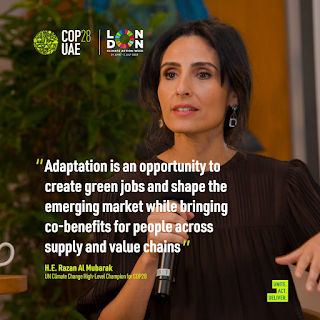The Power to Persuade: finance leaders raise their voices for science-based policy
The Power to Persuade: finance leaders raise their voices for science-based policy
Leading financial institutions are aligning their advocacy efforts with their net-zero commitments, to drive transformational change in their sector - and beyond. The capacity to persuade is a critical component of the Race to Zero criteria, which involves organisations actively going beyond their internal climate action policies to call for ambitious regulation on net zero and resilience.
Financial systems are the endoskeletons of our economies, and the three limbs of the system: insurance, banking and investment carry tremendous potential to drive transformation, through engagement. For example, when finance institutions advocate for self-regulation to create a level playing field for decarbonisation, this can send positive and impactful signals to governments. Areas where banks, insurers and investors can advocate for change include internalising the cost of carbon pollution onto corporate balance sheets, introducing emissions trading schemes, and campaigning to phase out fossil fuel subsidies.
Net Zero Asset Managers (NZAM) member, Aviva Investors, for example, has proposed an ambitious roadmap to reset and repurpose the global financial architecture - by reorienting markets to support, not undermine, the Paris Agreement goals, and working in the collective interests of all countries and stakeholders.
In 1944, the original Bretton Woods Conference created the financial architecture the world needed to lift us from the Second World War. Now, Aviva has set out a vision to hold a ‘New Bretton Woods’ meeting in 2024 to realign the priorities of the global financial system to deal with climate change. Aviva’s Climate Emergency Roadmap for the International Financial Architecture is clear: a meaningful cost on carbon – with clear market guidance on the rising future price curve, increases in minimum pricing and measures to avoid carbon leakage – “...is a necessary and essential part of the required response to the climate emergency.”
Aviva is also advocating for the creation of a ‘unified global transition plan,’ combining the transition plans of all governments, policymakers, regulators, supervisors, market participants and corporations. This vision for transition plans as a lever for accountability is evident within the UK government’s Transition Plan Taskforce, (an initiative that Aviva co-chairs), to introduce mandatory transition plans across all corporations, to deliver the country’s legally binding net zero target.
Aviva is not alone; other financial institutions, including Legal & General, Phoenix Group, NN Group and Nordea, also rank highly in InfluenceMap’s league table of companies that direct lobbying towards sustainable finance policy. Forward-thinking investors are also joining the groundswell. The Global Investor Statement to Governments on the Climate Crisis, for example, calls for ambitious government policy to leverage private capital for climate action. It has been signed by 603 investors, representing $41 trillion USD assets under management. The Statement contains bold investor-led policy recommendations, for example, calling for enhanced national commitments; implementation of the Global Methane Pledge; strengthened climate disclosure; and increased climate financing for developing countries.




Comments
Post a Comment